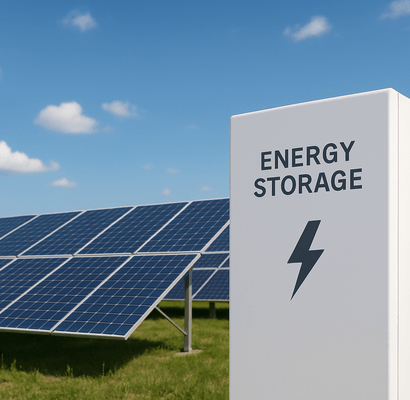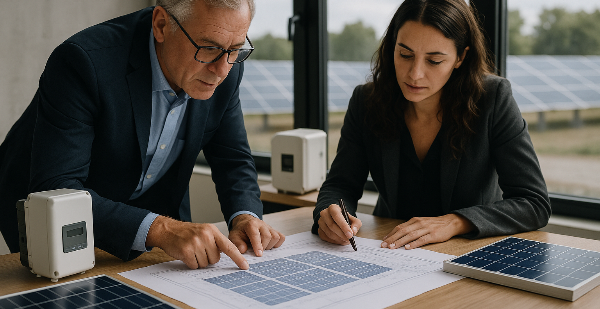Key Takeaways
• Energy storage helps balance supply and demand.
• Battery storage plays a key role in cutting carbon emissions.
• Storing energy supports the use of renewable power sources.
• Energy storage systems can lower costs and boost grid resilience.
Energy storage is a simple but important tool that helps reduce the impact of climate change. Batteries and other storage systems save power when it is easy to produce and release it when demand is high. This article explains why energy storage matters and how it helps in our fight against climate change. We use plain words and clear sentences to make ideas easy to understand.
The Role of Energy Storage Today
Today, power systems use energy storage to keep the electric grid steady. Many power stations use fossil fuels to produce electricity. However, wind and solar power produce energy only when the wind blows or the sun shines. Energy storage helps fill the gaps when production slows down.
Energy storage systems act like a storehouse. When energy is in excess, the storage unit collects it. When people need energy and sources like wind or solar do not produce enough, the storage unit sends the saved power back to the grid. This keeps energy supplies stable.
Why Does Energy Storage Matter?
Energy storage matters because it makes the power system more reliable and supports the use of renewable energy. Renewables like wind and solar do not work all the time. A sunny day or a windy afternoon can produce too much power. Other times, little power comes from these sources. Energy storage helps bridge these differences.
Battery storage helps reduce carbon emissions. When stored energy comes from renewables, it replaces power made by burning fossil fuels. Recent studies show that regions that use battery storage reduce the use of coal and oil. This leads to less air pollution and slower climate change. Energy storage also helps lower overall energy costs as it avoids the need to buy expensive backup power.
For example, a city in the UK has installed battery storage systems in key locations. This plan has helped the city manage higher peaks in energy use during the winter. The saved power from sunny summer days now supports homes and businesses during cold and less sunny periods. This change shows the energy storage climate impact on a city level.
Energy Storage and the Grid
The electric grid needs a constant balance between power supply and demand. Traditionally, power plants adjust output to match the exact demand. However, renewables do not allow this type of adjustment. Energy storage offers a solution by storing power when demand is low and releasing it during high demand.
This practice stabilises the grid. With storage units, the grid can run more smoothly, even when renewable energy fluctuates. A stable grid means fewer blackouts and less stress on power stations. Consumers get power without interruption, and the overall system runs more efficiently.
The Importance of Battery Storage
Battery storage stands out among energy storage options. Batteries are easy to install and use. They connect directly to the grid and can be used in small homes or large cities. Their ability to store and release energy quickly makes them a key tool in the fight against climate change.
The importance of battery storage is also shown by current data. In recent years, the cost of batteries has dropped considerably. This drop makes battery storage more affordable to businesses and households. Lower prices lead to wider adoption and further increase the use of renewable energy sources.
An example can be seen in a small village. A local energy plan used battery storage to store solar power. When the sun was not shining, the batteries supplied enough power for households. This reduced the need for power from fossil fuel sources and cut down on the village’s carbon footprint.
Current Data and Trends
Data show that energy storage systems have grown fast over the last few years. In 2022, the global market for energy storage increased by double digits. Many regions report that grid-connected battery storage helps cut down energy costs and boosts clean energy use.
Government support also helps energy storage grow. In the UK, there are new grants and low-interest loans to install batteries and other storage systems. These measures help communities switch to renewable energy faster. Renewable energy combined with storage is one way to lessen the effects of climate change on local and global levels.
Simple Steps to Implement Energy Storage
The value of energy storage lies in its simplicity and ease of use. Here are some steps to adopt energy storage in local communities or businesses:
Assess Energy Needs
Identify the times when energy is most needed. Gather data on when renewables produce energy and when the grid experiences peaks in demand. Use this data to decide how large a storage system should be.
Explore Storage Options
Research battery options and other storage methods. Compare costs, reliability, and maintenance needs. Battery storage is popular because it is easy to set up and has fast response times.
Plan the Installation
Work with local energy providers and experts to create an installation plan. The plan should include a schedule, budget, and clear steps for installation. Secure planning ensures a smooth transition to a storage system.
Monitor and Adjust
Once energy storage systems are in place, monitor their performance. Adjust the system as needed based on energy use patterns. This step ensures that storage systems work well with both the grid and renewable energy sources.
By following these simple steps, communities can add storage systems that improve the reliability of their power supply and reduce carbon emissions.
How Does Energy Storage Affect the Climate?
Energy storage has a clear effect on the climate. When energy is stored, more renewable energy can be used. This means that power generation shifts away from fossil fuels. Cleaner energy reduces greenhouse gases and improves air quality.
Data show that when battery storage supports wind and solar power, the overall emissions drop. Recent studies have noted that each megawatt-hour of stored renewable energy can replace up to one megawatt-hour of fossil-fuel power. This exchange plays a part in lowering the global average temperature rise and slows down the pace of climate change.
Building a Sustainable Future
Energy storage forms a bridge between modern energy needs and sustainable solutions. By storing renewable energy, societies can cut down on fossil fuel use and foster a cleaner environment. Investors and communities now see the benefits of energy storage beyond cost savings. They see a future with less pollution and more dependable power.
Many local projects show a clear trend. For example, one city in Europe built a battery storage system in its main power station. This system now supplies power during peak hours and supports local businesses. The project has cut the city’s reliance on older, polluting power sources and boosted local employment in green jobs.
Overcoming Barriers to Adoption
The main challenge in using energy storage lies in the initial cost. Many small businesses worry about the expense of installing storage systems. However, government initiatives and falling battery prices make these systems more attractive. Financial plans and local grants help lower costs, which makes it easier for communities to invest in energy storage.
Some countries have started pilot projects that combine renewable energy and battery storage. These projects show that energy storage climate impact is not just a theory. The projects deliver real savings and help store power for later use. Over time, these pilots encourage wider adoption and set a path for larger projects.
What is The Future of Energy Storage?
The future holds strong promise for energy storage. As technology improves, storage systems become more efficient and affordable. Governments worldwide continue to support green projects. Data from 2023 show that the installed capacity for battery storage is set to increase in the next few years. This increase can lead to a significant drop in carbon emissions and a more balanced energy grid.
The trend points to a future where energy storage plays a central role in managing power systems. People find that adding energy storage can help save money and reduce reliance on harmful fossil fuels. The simple act of storing power now allows consumers to enjoy uninterrupted energy and a cleaner environment later.
Practical Advice for Homeowners and Businesses
Both homeowners and businesses have options when it comes to energy storage. Homeowners with solar panels can add battery systems to store extra power. This stored energy can power homes during outages or when the panels are not working at full capacity. Many companies offer simple installation services that can be set up quickly and without hassle.
Businesses can also take advantage of large storage systems. By installing these systems, companies protect themselves against power failures. This stability helps in daily operations and reduces energy bills. The investment in energy storage can pay off over time in lower utility costs and a smaller carbon footprint.
Energy storage is a practical solution that helps fight climate change. It makes the grid steady and supports the use of renewable energy. Policy makers and community leaders have a clear choice. They can invest in energy storage to keep lights on and air cleaner. The benefits of doing so are clear in both data and everyday examples.
Leaders must support projects that install battery storage. This support leads to growth in green jobs, lower power costs, and a healthier environment. Society wins when we choose cleaner energy options and use storage to maintain a balanced grid.
Local councils, households, and business owners must join the push for energy storage. Projects that use battery storage show how a small change can have a big impact. With clear data and real examples, it is easy to see why energy storage matters in these times. Everyone plays a part in the fight against climate change when they choose to use energy storage.
Energy storage is one of the simplest tools to help manage our power supply and cut down on pollution. The energy storage climate impact is clear. By storing renewable energy, we reduce the need for fossil fuels and work towards cleaner air. Battery storage remains a key component. Its falling costs and ease of installation make it a good choice for today’s needs.
The ideas in this article remind us that energy storage is not a future idea but a current solution. From stabilising the power grid to lowering carbon emissions, the benefits are real and measurable. The steps towards a cleaner energy future are clear. We all benefit when energy storage is used wisely.
In summary, energy storage makes renewable energy more useful. It allows extra power to be saved and used when needed. This action cuts down the burning of fossil fuels and helps slow the pace of climate change. With clear data, simple examples, and a practical plan, the way forward shows that energy storage matters for both local and global progress.
By taking these steps, communities and businesses can enjoy cheaper, cleaner energy. They also protect the environment and pave the way for a sustainable future. Each small change counts when we work together to fight climate change. The importance of battery storage will grow as more people and leaders see its benefits.
Energy storage offers a simple answer to a big challenge. Its role in balancing supply and demand is undeniable. The choices we make today on energy storage will shape our tomorrow. We must embrace this solution to help secure a greener future for everyone.
FAQs
Q1: What is energy storage in simple terms?
A: Energy storage means saving excess electricity for use later. It helps balance supply and demand, especially with renewables like solar and wind that don’t produce power all the time.
Q2: How does battery storage work with renewable energy?
A: Battery storage collects extra energy from sources like solar panels during the day and releases it when demand is high or the sun isn’t shining.
Q3: Why is energy storage important for the environment?
A: Energy storage reduces reliance on fossil fuels by using more renewable power. This helps lower carbon emissions and air pollution.
Q4: How does energy storage help during power demand spikes?
A: Stored energy can be released when demand is high, preventing blackouts and reducing the need for costly backup power.



